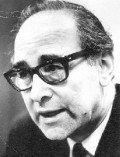vendredi, 20 août 2010
In memoriam: Thomas MOlnar (1921-2010)
 Thomas Molnar, the esteemed political philosopher and historian, passed away on July 20 at the age of eighty-nine. Dr. Molnar was a friend of ISI from its earliest days. He lectured frequently for the Institute and contributed many articles to the Intercollegiate Review and Modern Age. In 2003 ISI awarded him its Will Herberg Award for Outstanding Faculty Service.
Thomas Molnar, the esteemed political philosopher and historian, passed away on July 20 at the age of eighty-nine. Dr. Molnar was a friend of ISI from its earliest days. He lectured frequently for the Institute and contributed many articles to the Intercollegiate Review and Modern Age. In 2003 ISI awarded him its Will Herberg Award for Outstanding Faculty Service.
Requiescat in pace.
The following profile of Dr. Molnar was originally published in American Conservatism: An Encyclopedia (ISI Books, 2006). Also, consult the First Principles archival section to read some of Dr. Molnar’s fine essays.
A political philosopher by training, Thomas Molnar was born June 26, 1921, in Budapest and studied in France just before the Second World War, by the end of which he found himself interned in Dachau for anti-German activities. His first book, Bernanos: His Political Thought and Prophecy (1960), was a pioneering study of the work of the famous French Catholic novelist, who had moved from membership in the Action Française to writing on behalf of the French resistance. Taking his cue from Bernanos, Molnar would, like the novelist, go on to become a fiercely independent and contrarian writer, as well as a critic of modern political and economic systems that attempted to deny or transform man’s nature and his place in the cosmos. As Molnar would write of Teilhard de Chardin in perhaps his most wide-ranging book, Utopia: The Perennial Heresy (1967): “[Teilhard’s] public forgets . . . that man cannot step out of the human condition and that no ‘universal mind’ is now being manufactured simply because science has permitted the building of nuclear bombs, spaceships and electronic computers.” Throughout his career, Molnar would remain the enemy of such transformative philosophical endeavors—whether they came in the form of Soviet communism or Western technological hubris. In this respect, his critique of classical and modern “Gnosticism” mirrored the work of the philosophical historian Eric Voegelin.
Revolted by the communist conquest (and 1956 suppression) of his homeland, Molnar early found himself interested in twentieth-century counterrevolutionary movements such as the Action Française and the Spanish Falangists. He examined such movements in his penetrating study The Counter-Revolution (1969), pointing to the quality they shared with their counterparts on the Left: a loathing of the rise of the commercial class and its mores. Regardless of the important constituencies such movements might find in the middle class—Engels was a factory owner’s heir, Maurras got his funding from French manufacturers—Molnar concluded that the animating sentiment of each such movement was hostility to the “bourgeois spirit.”
Molnar’s study of these secular counterrevolutionary movements revealed their limitations and their participation in the modern spirit that aims to “manage” human nature by means of state or party in accord with an ideological plan. Molnar rediscovered his childhood Catholic faith in the early 1960s, and it would ever after serve as the lodestar guiding his political, cultural, and philosophical writings. Among his most important books are Twin Powers: Politics and the Sacred (1988) and The Church: Pilgrim of Centuries (1990), which examine the struggle between church and state in medieval and early-modern history—and this battle’s continuing implications for politics and ecclesiastical governance. Molnar identifies two destructive tendencies rooted in the medieval and early-modern periods whose implications only became obvious in the twentieth century: first, Erastianism, the subjection of spiritual authority to the power of the state or the preferences of civil society; and second, Puritanism, a claim by the state to spiritual power and redemptive purpose.
Molnar was one of the earliest writers and academics to associate himself with the Intercollegiate Society of Individualists (later Intercollegiate Studies Institute), joining its lecture program and frequently publishing in the Intercollegiate Review and Modern Age. His writing also appeared in dozens of other publications and in several European languages on topics ranging from classical history and French literature to foreign policy and modern philosophy. Molnar traveled to every inhabited continent and moved increasingly in his later years toward a global, world-historical (rather than particularly Western) view of events; he retained, however, a firmly Catholic faith that rendered him skeptical of secular undertakings, including the conservative movement. A personal friend of luminaries Russell Kirk and Wilhelm Röpke, Molnar was more pessimistic than either of those thinkers about the prospects of saving the essentials of Western civilization from the advancing effects of the “ideology of technology,” which promised with more apparent plausibility than did previous systems (such as Marx’s) to make man into a different animal, if not in fact a god. Molnar was the author of more than thirty books.
Further Reading- Molnar, Thomas. The Decline of the Intellectual. Cleveland: World, 1961.
- ———. The Emerging Atlantic Culture. New Brunswick, N.J.: Transaction, 1994.
- ———. The Pagan Temptation. Grand Rapids, Mich.: Eerdmans, 1988.
00:10 Publié dans Hommages, Philosophie | Lien permanent | Commentaires (0) | Tags : catholicisme, conservatisme, droite, contre-révolution, philosophie, théorie politique, sciences politiques, politologie |  |
|  del.icio.us |
del.icio.us |  |
|  Digg |
Digg | ![]() Facebook
Facebook



Les commentaires sont fermés.